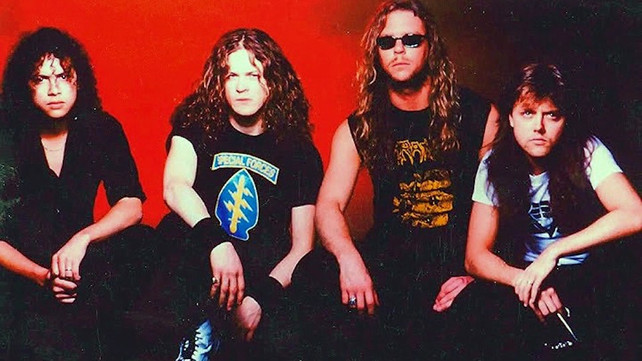Lars Ulrich: The Song That Marked the Peak of Metallica’s Progressive Side
“Five minutes of, basically, what we jokingly call ‘math metal,'” the drummer says.

Metallica drummer Lars Ulrich was asked by Jan Gradvall about the band’s decision to create less complex music on 1991’s “Black Album,” to which he replied (via Blabbermouth):
“[Metallica co-manager] Cliff [Burnstein] and I went under the bleachers in Toronto. We were playing with Aerosmiith. It was the summer of 1990, and it was the very end of the ‘Justice’ cycle.
“It was James, me and [Cliff], and we went under the bleachers at the CNE [Stadium] in Toronto in the summer of 1990. And we sat and told Cliff that we felt that we had pushed the progressive side of Metallica…
“The last song on the ‘…And Justice For All’ album was a song called ‘Dyers Eve,’ which is five minutes of, basically, what we jokingly call ‘math metal.’

“So we found, as we were going along on that tour, as the audiences became bigger and bigger, that some of the crazier, 10-minute progressive songs felt like they were connecting less and less with the audience. And we felt that we had, from a creative point of view, pushed [the prog stuff to the limit]…
“Where do you go after ‘Dyers Eve’? It’s, like, you have reached the end of that – there’s nothing beyond that. So we decided that we were gonna try to take… We creatively wanted to take a turn. And so we figured that simplicity and trying to be a little more cohesive… we needed to do something else. And… we did.
“And then we made the ‘Black Album’ with Bob Rock and then all of that happened. We felt like we were on a creative journey that – and we’ve always felt like we’ve been on a creative journey that always needs to be reinvigorated, reinvented.
“And I think we, as people, have a fear of repetition, or fear of being stuck. And maybe even to the point where you could argue that we fight it too much. I think we may have made a couple of turns at some point that were almost too much, just because we don’t wanna be fucking trapped in what people want from us, what the community expects from us.
“And we are so fiercely independent and autonomous, and nobody’s gonna hold us back, and we’re just gonna keep changing it up all the time. But this record really was a reflection on… I think if you look at the first four records – ‘Kill ‘Em All,’ ‘Ride the Lightning,’ ‘Master of Puppets,’ ‘…And Justice for All’ – there was a natural progressive growth and evolution that just came to an end point at the end of the ‘…And Justice for All’ album.
“And the only place forward, other than repeating yourself or getting stuck in that moment, was to do something completely different, and that’s what we did for the next couple of years.”







